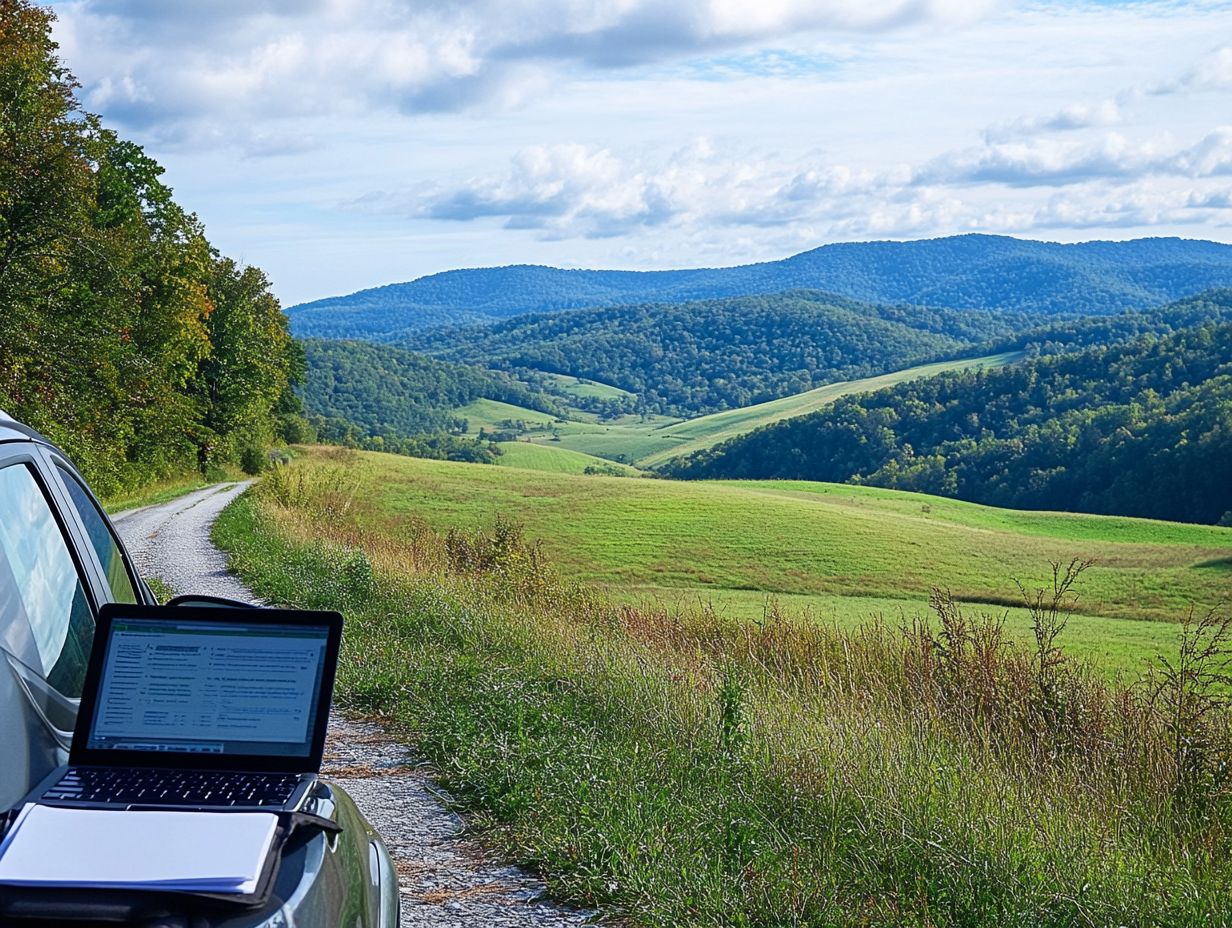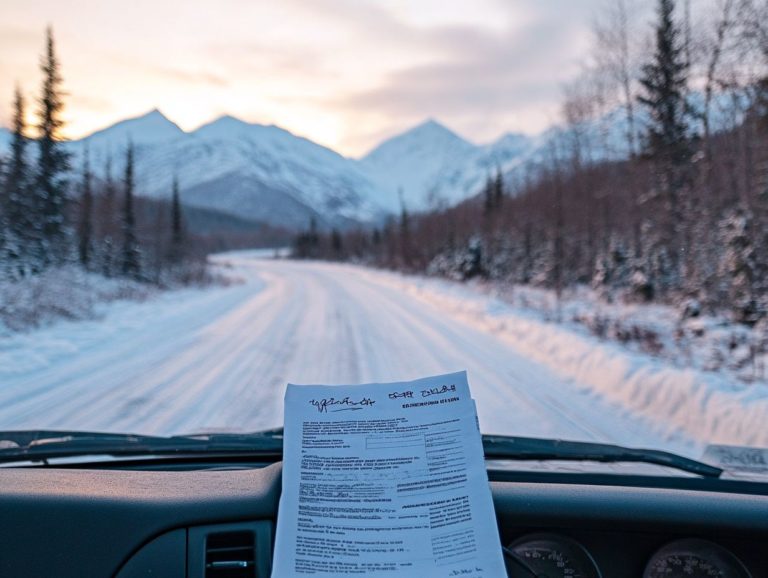Auto Insurance Options for West Virginia Drivers
Navigating auto insurance can indeed feel overwhelming, particularly in a distinctive state like West Virginia. This guide provides a comprehensive breakdown of everything you need to know, from the state’s specific requirements and minimum coverage levels to the array of policies available to you.
It delves into the factors that can influence your insurance rates, including your driving record and the type of vehicle you own. It also highlights potential discounts that can help you save significantly.
By the end, you’ll be well-equipped to select the auto insurance policy that perfectly aligns with your needs.
Contents
Key Takeaways:

- West Virginia drivers must have at least the minimum required auto insurance coverage to legally drive in the state.
- Drivers should consider their driving record, vehicle type, and location when determining their auto insurance rates.
- Researching and comparing quotes from different providers can help drivers find the best coverage for their individual needs and potentially save money through discounts and savings opportunities.
Overview of Auto Insurance in West Virginia
Auto insurance in West Virginia is your key to essential financial protection, safeguarding you against many risks that come with driving. Understanding auto insurance is crucial for your peace of mind on the road!
With local players like Erie Insurance and USAA alongside national behemoths, the auto insurance landscape is rich and diverse. You ll find a range of policies, including liability insurance, comprehensive coverage, and collision coverage, all tailored to address different situations and driving conditions that you might encounter.
State Requirements and Minimum Coverage
In West Virginia, you must meet specific state requirements for auto insurance. This primarily focuses on minimum coverage, which includes liability insurance for bodily injury and property damage.
This minimum coverage requires you to carry liability insurance to cover expenses related to injuries or damages you may cause to others in the event of an accident. These state minimums aren t just random numbers; they re designed to provide you with some financial protection against unexpected incidents.
If you fail to comply with these legal requirements, you could face significant penalties, including fines or even the suspension of your driving privileges. Therefore, understanding and adhering to these insurance laws is essential for you as a motorist.
This knowledge helps you avoid both financial and legal troubles, ensuring you have peace of mind while navigating the roads.
Types of Auto Insurance Coverage
Grasping the different types of auto insurance coverage is crucial for you as a driver in West Virginia. This knowledge enables you to choose policies that align perfectly with your needs and driving habits.
The primary categories to consider include liability coverage, which is a legal requirement. You should also consider collision coverage, which pays for damages to your car from accidents, and comprehensive coverage, which protects against non-accident events like theft or natural disasters.
You can also tailor customized coverage options to fit your unique circumstances, ensuring that you’re optimally safeguarded on the road.
Liability Coverage
Liability coverage is an essential element of auto insurance, offering you protection against claims made by others for damages or injuries you may cause in an accident.
This coverage is divided into two primary categories: bodily injury liability and property damage liability. Bodily injury liability addresses medical expenses, lost wages, and other costs incurred by individuals injured in an accident where you are at fault.
Conversely, property damage liability covers the expenses for repairs or replacement of vehicles and other property that might be damaged during the incident. In West Virginia, having adequate liability coverage isn’t just a smart move; it s a legal requirement.
You must ensure that your policy meets the minimum limits set by the state to effectively protect yourself from potential financial burdens that could arise from accidents.
Don t wait! Get informed today to avoid costly penalties down the road.
Collision Coverage
Collision coverage is an optional aspect of auto insurance. It provides you with financial protection for damages to your vehicle resulting from a collision, regardless of who s at fault.
This coverage allows you to recover repair costs swiftly. You won’t have to wait around for another party’s insurance to come through.
A variety of factors can influence the premium rates you encounter with collision coverage, such as your driving history, credit score, and the safety ratings of your vehicle.
For example, if you own a sports car, you might face higher premiums. This is due to the increased repair costs and the likelihood of being in accidents.
Conversely, a practical sedan could lead to more favorable rates.
Ultimately, the advantages of collision coverage go beyond just financial compensation. It offers you peace of mind, knowing you’re protected in the unfortunate event of an accident.
Comprehensive Coverage

Comprehensive coverage is an essential component of auto insurance. It protects you against a multitude of risks that can threaten your vehicle beyond mere collisions, such as theft, vandalism, and natural disasters.
This type of insurance is critical for drivers who wish to shield their assets from unforeseen events. These events could lead to substantial repair costs or even total loss.
It works hand-in-hand with collision coverage, ensuring you are fully protected whether you face an accident or experience incidents like hail damage or fire.
Wondering why premium rates fluctuate? It s all about the factors at play. The age of your vehicle, its safety features, your driving history, and even your geographical location all play a significant role in determining the overall cost of maintaining comprehensive insurance coverage.
Factors Affecting Auto Insurance Rates
When considering auto insurance rates in West Virginia, several key factors come into play. Your driving history, the type of vehicle you choose to insure, and the primary location where you drive all significantly influence the rates you’ll encounter.
Driving Record
Your driving record is a crucial factor in determining your auto insurance rates. Insurance companies analyze it to assess the chance of accidents or claims based on your past behavior.
A clean driving record showcases your ability to operate a vehicle safely and responsibly. It also translates into substantial savings on your insurance premiums.
Insurers often extend various discounts to those who demonstrate safe driving habits, acknowledging their lower risk of filing claims. Conversely, if your history includes accidents or traffic violations, you ll likely see higher rates.
This disparity highlights the financial advantages of maintaining a pristine record. Safe drivers can revel in reduced costs while also enhancing their overall coverage experience.
Vehicle Type
The type of vehicle you choose to insure has a significant impact on your auto insurance rates. Factors such as make, model, age, and safety features all play crucial roles in the equation.
For example, sedans typically come with lower premiums thanks to their reputation for safety and reduced repair costs.
In contrast, SUVs, while undeniably versatile, often carry higher rates due to their size and the potential for causing more damage in collisions.
High-performance cars, however, can send your costs soaring. Their powerful engines are linked to a greater likelihood of speeding tickets and accidents.
Insurers meticulously evaluate these characteristics, considering the likelihood of claims based on the type of vehicle you select. This careful assessment allows them to gauge risk more accurately and establish appropriate premiums in line with your vehicle choice.
Location
The location where you reside can significantly impact your auto insurance rates. If you live in an urban area, you may notice higher premiums due to increased traffic and challenging driving conditions.
In West Virginia, cities like Charleston and Huntington illustrate this trend. Factors such as population density raise the likelihood of accidents. Heavily populated areas tend to have congested roads and more vehicles, which increases the potential for collisions.
Crime rates in urban areas can affect your rates. Higher instances of vehicle theft or vandalism can lead insurers to raise your premiums. Driving conditions can also vary significantly between rural and urban regions, with hazardous weather impacting urban areas in unique ways, further influencing the insurance costs you may face in these cities.
Discounts and Savings Opportunities
Auto insurance in West Virginia offers many discounts and savings opportunities that can lower your insurance costs, especially if you qualify for specific incentives.
Safe Driver Discounts

Safe driver discounts are a great incentive offered by many insurance companies. They reward you for your clean record and responsible driving habits with lower rates. These discounts not only encourage careful driving but also provide financial rewards for avoiding accidents and traffic violations.
To qualify for these discounts, you typically need to maintain a spotless driving record for several years, be free of claims, and often complete a defensive driving course, which teaches safe driving techniques. By practicing safe driving, you can enjoy peace of mind and a notable reduction in your insurance premiums.
This is a great opportunity for anyone who drives responsibly!
Multi-Policy Discounts
Multi-policy discounts reward you when you bundle your auto insurance with other policies, such as home insurance. This approach helps you save money while streamlining your coverage.
Bundling not only simplifies managing various policies but can also lead to significant reductions in your premiums. You might be surprised to discover that combining multiple policies can yield substantial savings as you evaluate your insurance needs.
Working with local insurance providers allows for personalized attention, helping you understand your options and any potential bundling benefits. Local agents are usually well-acquainted with the unique needs of their communities, making it easier to create a package that aligns with your budget and coverage requirements.
Choosing the Right Auto Insurance Policy
Selecting the ideal auto insurance policy is essential for drivers in West Virginia. It significantly influences both your financial security and overall peace of mind while navigating the roads.
Evaluating Coverage Needs
Evaluating your coverage needs is a crucial step in selecting the right auto insurance policy. This ensures you secure the appropriate level of financial protection tailored to your belongings and personal circumstances.
A thoughtful assessment involves considering your driving habits, the type of vehicle you own, and your overall financial situation. Frequent commuters or those in bustling urban environments face different risks compared to someone who mainly uses their vehicle for weekend drives.
The type of vehicle you own is also important; newer or high-value cars may need more extensive coverage than older models. Your financial status plays a vital role in determining your coverage choices. If you have more assets, you might prefer higher limits to shield against potential liabilities, while someone on a tighter budget may opt for the minimum required protection.
Comparing Quotes and Providers
Comparing quotes from different insurance providers is crucial. It can lead to better coverage options and lower premium rates.
Take the time to explore various offers. This helps you pinpoint policies that truly fit what you need.
Carefully interpret the details of each quote. Each one presents different levels of coverage, deductibles, and specific inclusions or exclusions.
Understanding these factors helps you see the real value of the insurance. You can then distinguish between what is essential and what is excess.
Make your choice count! Evaluate your options carefully for the best protection.
Frequently Asked Questions
Minimum Requirements

In West Virginia, drivers must have liability insurance. The minimum coverage is $25,000 for bodily injury per person, $50,000 for bodily injury per accident, and $25,000 for property damage.
Additional Options
West Virginia drivers can choose from various options like collision coverage, comprehensive coverage, uninsured/underinsured motorist coverage, and personal injury protection.
Customizable Policies
Yes, most insurance companies allow you to customize your policy. You can select coverage types and limits that suit your driving habits and budget.
Discounts Available
Various discounts are available for West Virginia drivers. These include safe driver discounts, multi-car discounts, and discounts for completing a defensive driving course.
What If the Other Driver Is Uninsured?
If you have uninsured/underinsured motorist coverage, your insurer will cover your injuries and damages, up to your policy limits.
Switching Insurance Companies
Yes, you can switch your auto insurance policy at any time. Research and compare quotes to find the best coverage and rates for your needs.




